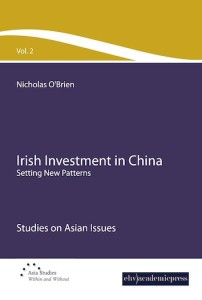Irish Investment In China. Setting New Patterns ~ Contents, List Of Abbreviations & Glossary Of Terms
No comments yet Now online: Nicholas O’Brien – Irish Investment in China. Setting new patterns.
Now online: Nicholas O’Brien – Irish Investment in China. Setting new patterns.
Consideration of Irish investment in China will be located within the context of investment theory. Accordingly, chapter two examines the seminal literatureon foreign direct investment and sets out an appropriate model of investment theory within which this research shall be considered. The limited literature on Irish outward FDI is also considered, with specific emphasis on Barry et al’s model on Irish outward FDI.
Chapter three outlines the results of this research and emerging themes are identified. This allows conclusions to be drawn as to whether Barry et al’s model holds in the case of Irish FDI into China. It should be stressed that this is not in any manner a judgement on Barry et al’s model. Rather, it is a reflection on the nature of China as an emerging economy and the unique political economy which it enjoys.
Chapter four draws on the research to explore the opportunities and challenges which China represents. The principal locational advantages and disadvantages which China poses are set out. It is argued that the major potential which China represents for Irish investors lies in market opportunity rather than in low labour costs, an opinion which is supported by the relevant literature on FDI in China. The principal locational disadvantages are identified as existing in the regulatory, cultural and legal environments. This allows conclusions to be drawn on our sub-hypothesis, namely the challenges which China poses for investors.
Chapter five explores the nature of Irish FDI into China. The non-application of Barry et al’s model to China is discussed together with our prescriptive research question, namely the desirability of state involvement in outward FDI. This chapter also seeks to explain why Irish FDI into China is different from that in the traditional destinations for outward FDI.
The concluding chapter draws on previous chapters to identify conclusions which can be drawn. Key findings are highlighted and potential areas for further research suggested.
Chapter 1 – The Giant Arises
Introduction
Research Methodology
Outline
Chapter 2 – The Nature of Outward FDI
Introduction
Investment Defined
Dunning’s Eclectic Paradigm
Investment Theory
The Role of the Multinational Enterprise in FDI
Why FDI Occurs
Irish Outward FDI
Barry’s Model on Irish Outward FDI
China and Inward FDI
Relationships and Contract Law
Conclusion
Chapter 3 – The Views of Investors
Introduction
Profile of the MNEs Included in This Research
Structure of the Chinese Subsidiaries
Rationale for Investing and Incentives
Incentives
Experience Since Investing
Disincentives and Barriers to Investing in China
Guanxi
Intellectual Property Rights
Contract Law
Role of the State
Investors in Eastern Europe
Conclusion
Chapter 4 – A land of Opportunity and Challenge
Introduction
Locational Advantages which China Offers
Locational Disadvantages which China Poses
The Regulatory Framework
China’s Culture
Contract Law
Intellectual Property Rights
Corruption and the Giving of Gifts
Regionalism – Advantages and Disadvantages for FDI
Conclusion
Chapter 5 – Irish FDI into China–Evidence, Potential and Policy
Introduction
Barry’s Model
Irish FDI into China and Barry’s Model
The Potential for Irish Investment
Home Country Effect
Irish Public Policy
Conclusion
Chapter 6 – Conclusions & Bibliography
Introduction
Main Findings
Conclusion
Bibliography
List of Abbreviations
China – This term is used to refer to the People’s Republic of China
CSO – Central Statistics Office, Ireland
EJV – Equity Joint Venture
EJVL – Equity Joint Venture Law
EU – European Union
FDI – Foreign Direct Investment
HFDI – Horizontal Foreign Direct Investment
IFC – International Finance Corporation
IMF – International Monetary Fund
IPR – Intellectual Property Right
M&A – Merger and Acquisition
MNC – Multinational Corporation
MNE – Multinational Enterprise
NBER – National Bureau of Economic Research
OECD – Organisation for Economic Co-operation and Development
OLI – Dunning’s Eclectic Paradigm model: Ownership advantage, Location advantage and Internalisation advantage
SEZ – Special Economic Zone
UNCTAD – United Nations Conference on Trade and Development
US – United States of America
VFDI – Vertical Foreign Direct Investment
WFOE – Wholly Foreign Owned Enterprise
WFOEL – Wholly Foreign Owned Enterprise Licence
WTO – World Trade Organisation
Glossary of terms
Foreign Direct Investment (FDI) – the value of financial flows from ‘home’ countries to foreign affiliates in ‘host’ countries, in which a direct investor has a controlling interest.
Host economy – the country that receives FDI from the foreign investor.
Home economy – the country of origin of the investment.
Inward Direct investment – refers to direct investment by foreign investors in the host economy.
Multinational Enterprise – incorporated or unincorporated enterprise comprising parent enterprise and its foreign affiliate(s).
Outward Direct Investment – direct investment by investors from the home economy Pearl River Delta – Hong Kong and its surrounding hinterland.
Subsidiary – an incorporated enterprise in the host country in which the foreign investor owns at least 50 per cent of the shares or has the right to remove a majority of the board.
Yangtze River Delta – Shanghai and its surrounding hinterland.
You May Also Like
Comments
Leave a Reply








